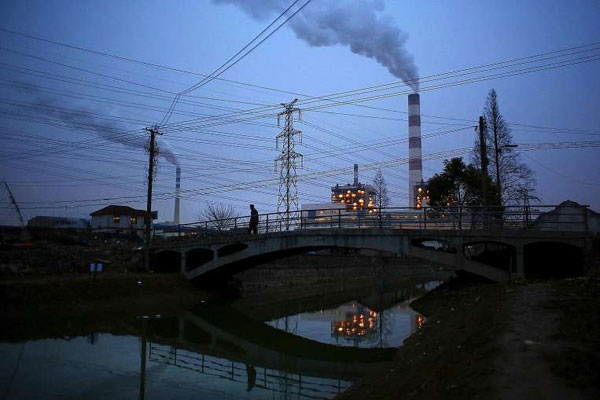Challenges loom for China's carbon market plan
(The Straits Times) Updated: 2015-10-07 00:11Editor's note: This article is run by The Straits Times (Singapore), which, together with China Daily and other 32 global media, forms Climate Publishers Network.
 |
|
Smoke rising from a thermal power plant in Shanghai.[Photo/Agencies] |
Experts say stringent caps, legislation and implementation at local levels key to success
China's plan to launch a national emissions trading market in 2017 has injected fresh political energy into talks ahead of December's climate change summit in Paris, but experts say Beijing will have to overcome daunting challenges to develop a successful carbon market.
Since it was announced by President Xi Jinping last Friday as part of joint United States-China pledges on climate change, Beijing's push to create the world's biggest carbon market has been met with some scepticism due to the sheer difficulty of the task.
"The announcement of the carbon market will strengthen the prospect of China achieving its climate targets... (but) it does not mean its establishment will be without challenges," said Greenpeace East Asia campaigner Li Shuo. "The central government will need to find a way to ensure implementation at the local levels... and ensure the emissions cap is stringent enough to have a meaningful environmental impact," he added.
Doubts have also surfaced, for instance, as to whether the Chinese authorities can accurately monitor and verify emissions, allocate permits and develop transparent policies and trading platforms that assure companies they are being treated equally. Corruption is yet another problem.
Cap-and-trade schemes work by limiting the amount of pollution businesses can emit and then letting them pay competitive prices for a share of the quota.
Firms that do not use up their quota can sell the remainder, while those that need more than their allotment can buy additional permits.
China's attempt to put a price on carbon is not entirely new.
The world's biggest producer of carbon dioxide has started pilot programmes in seven cities and provinces including Beijing, Tianjin and Chongqing since 2013.
But results have been mixed. Unclear rules and inexperienced regulators have led to problems in monitoring emissions and pricing permits. Similar problems plague the faltering 10-year-old emissions trading programme in Europe that has been criticised for giving out permits too easily and failing to change companies' energy behaviour.
Experts say China can learn from the experience of Europe and other countries to build a better carbon market, which will cover key Chinese sectors including power generation, iron and steel, chemicals and cement.
Its huge transport sector has been left out for now.
Dr Lu Xuedu, an adviser on climate change and the carbon market at the Asian Development Bank, said China should take the important step of enacting legislation to pave the basis for the market.
"One problem the European market has faced is the lack of a clear legal definition of the long-term value of carbon credits, which has led to the falling price of carbon. So when China establishes its own market, the value of the permits should be clear and protected by law," he said.
Getting accurate data for emissions is also crucial to give the market confidence and China should provide more training for regulators and put in place harsh penalties for non-compliance, he added.
Still, China's latest move is seen as another breakthrough in environmental cooperation with the US, the world's second biggest polluter, and a stimulus for negotiations on a new global climate change pact in Paris.
Implementing a national carbon trading market will also help China meet its goal in a landmark deal with the US last November to ensure that its carbon emissions peak by 2030, the first time Beijing had given a timeline for a peak.
Mr Li said: "It is important to note that there is probably no system that goes without hiccups, but there are many places in the world that do not even have a system. The US, for example, failed to put a national price tag on carbon in 2009."
While it could take years - even with presidential weight thrown behind the goal - to build a system that can play a significant role in curbing emissions, experts say that the signalling effect is an important one. World Resources Institute president Andrew Steer said: "China has repeatedly shown that it's serious about reining in its emissions. By committing at the highest level to a national carbon trading programme, it is making its intentions clear to businesses and investors about its shift to a low-carbon economy."
View the original article here.
- Typhoon leaves trail of death and mayhem
- Transport delays reduce the time windows for organ transplants
- Ex-HK chief executive in court on misconduct charges
- Xi's initiatives at UN 'generous opportunity' for developing countries
- Excavation of famed Chinese warship underway
- Chinese officials reprimanded for failing to control straw burning
- S China braces for typhoon Mujigae
- China urges US to respect core interests
- Suspect of South China's serial blasts confirmed dead
- Vendors hired to deliver Liuzhou parcel bombs







